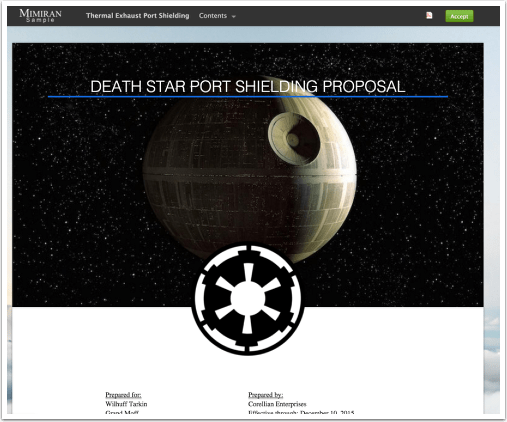You may have heard a new Star Wars movie is coming out. I think it’s some kind of indy documentary about the Reagan-era missile defense system.
Who are we kidding? It’s Star Wars. With JJ Abrams, so we hope it will actually be good.
It also means that I can pretend to do work, like writing a business blog post, by talking about Star Wars. TGIF.
I’ve been a fan of Star Wars since I was a kid. We would have snowball fights at recess on “Hoth” and argue about who got to be Luke Skywalker. Looking back, this makes about as much sense as using lumbering AT-ATs to attack a base, when you have better air power than anyone in the galaxy, but it was lots of fun.
People have written a lot about how Star Wars invented the modern block buster sequel engine, and the modern merchandising tie-in business, but I think there’s actually a deeper, simpler lesson in the movies. Before we get to that…
Since so many people not only understand, but have a connection to Star Wars, it’s a nice way to talk about things in business. For example, here’s my view of the typical cover page of a proposal, presented in Star Wars text crawl form to highlight how incongruous it is to drain the excitement out of these documents.
On a slightly more serious note, the reason Star Wars works so well is that it’s a great story. It’s fun, action-packed, slightly serious without taking itself too seriously, and you really want to see what happens next. The story is so much fun that we overlook that a lot of the writing isn’t so great. One thing I give Lucas credit for is that he resigned from the directors guild rather than put a bunch of credits at the beginning, exactly where they interrupt the story, just as it’s starting. (See Are your sales proposals like the worst movie ever?)
So much corporate writing, whether on websites or in proposals, forgets or deliberately omits the story. It would be like Star Wars being about the need for better data security protocols. (Some of you are probably wondering what I’m talking about, then saying, oh right– it all starts with stolen data being put into R2.) Or perhaps the need to transport data from one location to another. (Han flying the motley crew to Alderaan.) You could have a 12 point plan with deliverables and tasks and sub-requirements. That would be incredibly boring. It’s not the details aren’t important– of course they are– it’s that if you lose site of the mission and the story, no one gets excited about anything.
When Scott Forstall recruited the original members of the iPhone team, he told them he was working on something so secret he couldn’t tell them anything about it, except that it would be really cool and they’d work like dogs for years. That’s actually a much more interesting pitch than giving people details of the job, much of which is probably pretty tedious day-to-day.
Naturally, your website can’t say, “I can’t tell you what we sell, but it’s super awesome and you should give us lots of money to buy it.” But you can tell a story. It probably won’t become a massive cultural phenomenon that’s so important to humanity that people will clamor for more and then hate you for not making it the right way, but…
Of course, if galactic corporations had better sales technology, perhaps the original Death Star would never have been destroyed.
(Click image to see details.)
To start simply, change some of your boring corporate jargon “About Us” copy to an actual story, with actual people. (Here’s Mimiran’s origin story.) Talk about why your company does something. And talk about why you as a person do this. (When I help companies with the text of their proposals, I usually cut out everything in the “About Us” section, and replace it will a simple message from the founder, along with a picture. People buy from people, and if you can tell a story about why you do what you do, that helps people understand you better, and more ready to buy. Google may or may not care about good stories for SEO, but if you get more backlinks from interesting content, that will be more helpful than a page that’s obviously littered with keywords that no one cares about.
Try it. It will only take a few minutes. (Let me know how it goes. I know I was originally scared to get away from the anonymizing wall of impersonal corporate-speak, but I realized that it wasn’t helping, it was just wasting my prospects’ time.)
That’s the real lesson of Star Wars– tell a great story. (Just make sure you have the right hero– a lot of business writing screws this up.)
Who’s the hero? If you’re writing your web copy and your proposals as if you’re Luke, you have a problem. If you highlight the tech and the tools (3PO, lightsaber), you have a problem. You’re the helpful old man who helps the real hero (the customer) realize their potential.
OK, enough… Hope you have your tickets. Hope there’s no Jar Jar (although check that last link at the bottom). Make sure you eat a good breakfast, and may the Force be with you.
p.s. Don’t forget to check out this great breakdown of the light side and the dark side by screen time and technique in the movies. Nice visualization. And an account of Luke Skywalker’s path to extremism.
p.p.s. For even more Star Wars fun, check out Slate’s piece on how Lucas blended different genres and influences to create something familiar, yet new.
p.p.p.s. Don’t know how I just discovered this, but here’s an awesome theory about The Phantom Menace (warning: if you’re a Star Wars fan, this could cost you a lot of time.)



